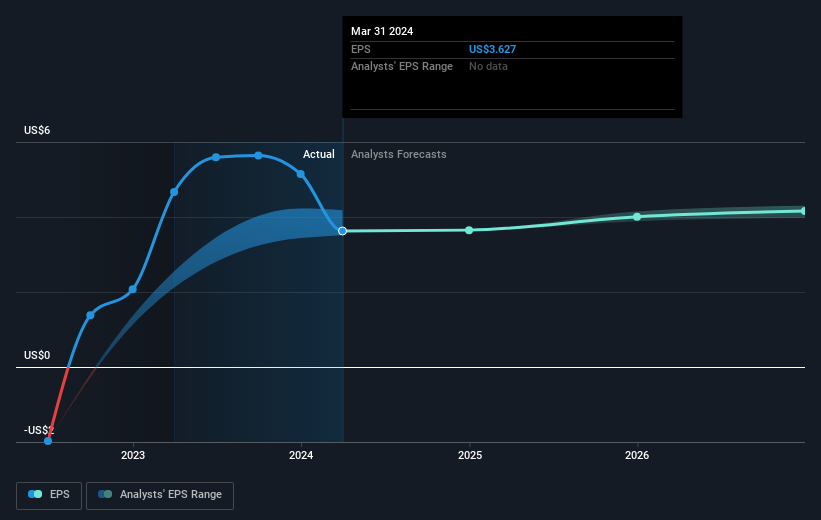- United States
- /
- Other Utilities
- /
- NYSE:PEG
Those who invested in Public Service Enterprise Group (NYSE:PEG) five years ago are up 44%
The main point of investing for the long term is to make money. Furthermore, you'd generally like to see the share price rise faster than the market. Unfortunately for shareholders, while the Public Service Enterprise Group Incorporated (NYSE:PEG) share price is up 22% in the last five years, that's less than the market return. Looking at the last year alone, the stock is up 19%.
Let's take a look at the underlying fundamentals over the longer term, and see if they've been consistent with shareholders returns.
View our latest analysis for Public Service Enterprise Group
To paraphrase Benjamin Graham: Over the short term the market is a voting machine, but over the long term it's a weighing machine. One imperfect but simple way to consider how the market perception of a company has shifted is to compare the change in the earnings per share (EPS) with the share price movement.
During five years of share price growth, Public Service Enterprise Group achieved compound earnings per share (EPS) growth of 3.0% per year. This EPS growth is lower than the 4% average annual increase in the share price. This suggests that market participants hold the company in higher regard, these days. That's not necessarily surprising considering the five-year track record of earnings growth.
The image below shows how EPS has tracked over time (if you click on the image you can see greater detail).

It might be well worthwhile taking a look at our free report on Public Service Enterprise Group's earnings, revenue and cash flow.
What About Dividends?
It is important to consider the total shareholder return, as well as the share price return, for any given stock. The TSR is a return calculation that accounts for the value of cash dividends (assuming that any dividend received was reinvested) and the calculated value of any discounted capital raisings and spin-offs. It's fair to say that the TSR gives a more complete picture for stocks that pay a dividend. We note that for Public Service Enterprise Group the TSR over the last 5 years was 44%, which is better than the share price return mentioned above. This is largely a result of its dividend payments!
A Different Perspective
Public Service Enterprise Group shareholders gained a total return of 24% during the year. Unfortunately this falls short of the market return. On the bright side, that's still a gain, and it's actually better than the average return of 8% over half a decade This suggests the company might be improving over time. It's always interesting to track share price performance over the longer term. But to understand Public Service Enterprise Group better, we need to consider many other factors. For instance, we've identified 3 warning signs for Public Service Enterprise Group (1 is a bit unpleasant) that you should be aware of.
If you like to buy stocks alongside management, then you might just love this free list of companies. (Hint: many of them are unnoticed AND have attractive valuation).
Please note, the market returns quoted in this article reflect the market weighted average returns of stocks that currently trade on American exchanges.
New: Manage All Your Stock Portfolios in One Place
We've created the ultimate portfolio companion for stock investors, and it's free.
• Connect an unlimited number of Portfolios and see your total in one currency
• Be alerted to new Warning Signs or Risks via email or mobile
• Track the Fair Value of your stocks
Have feedback on this article? Concerned about the content? Get in touch with us directly. Alternatively, email editorial-team (at) simplywallst.com.
This article by Simply Wall St is general in nature. We provide commentary based on historical data and analyst forecasts only using an unbiased methodology and our articles are not intended to be financial advice. It does not constitute a recommendation to buy or sell any stock, and does not take account of your objectives, or your financial situation. We aim to bring you long-term focused analysis driven by fundamental data. Note that our analysis may not factor in the latest price-sensitive company announcements or qualitative material. Simply Wall St has no position in any stocks mentioned.
About NYSE:PEG
Public Service Enterprise Group
Through its subsidiaries, operates in electric and gas utility, and nuclear generation businesses in the United States.
Average dividend payer with questionable track record.
Similar Companies
Market Insights
Community Narratives



